The Secret to Successful Seminar Follow-Up
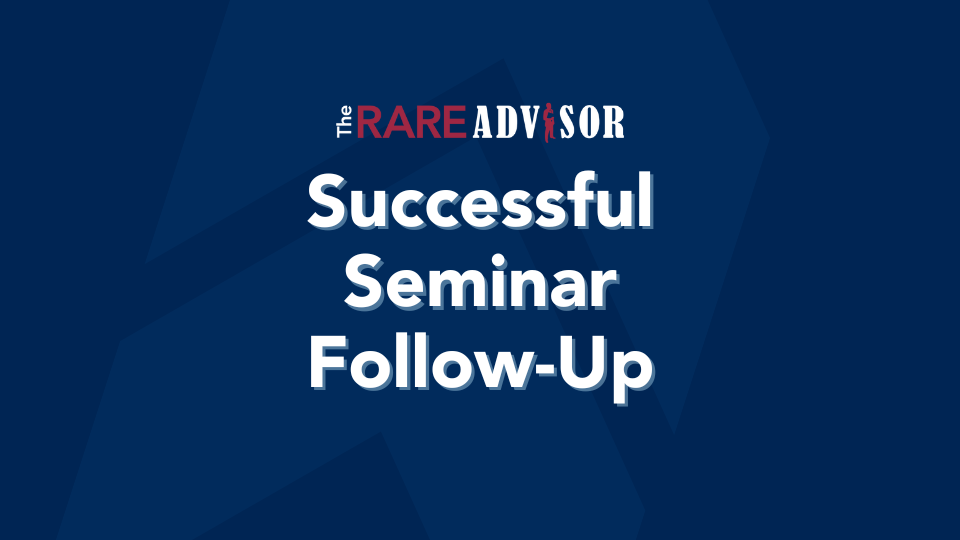
In this episode of The RARE Advisor, Aaron Grady and Alan Oehrlein – Practice Management Consultants at USA Financial - discuss the crucial importance of a robust seminar follow-up process. Discover how to implement best practices, from personalized communication and valuable resources to creating a sense of urgency and scheduling immediate appointments. Learn why the follow-up process starts during the seminar itself and how to effectively engage with attendees who may not have signed up for a meeting.
Aaron Grady, Advisor Consulting Director at USA Financial: Today, we want to take a few moments to talk about something that's been very topical when it comes to some of the coaching conversations we've had recently. And it's around seminar best practices, but more specifically, what do you do as part of the follow up process? Advisors invest a lot of money, time, energy, and resources in trying to acquire new client relationships. You do all the work, all the setup, you get through the event itself, you get down to the 10 yard line, and it's crazy how, many times, missing some little part of the process can cause you to fumble the snap and miss out on opportunities to increase your results. And so today, that's really where we want to focus. I've asked Allan to be part of this conversation as he deals with this quite a bit, and this conversation came up with a couple of advisors we were talking to the other day. So let's talk about seminar best practices, specifically the follow up process. And, I know there's kind of some nuances here - there's people that sign up and attend the seminar, people who attend but don't sign up. and there's people don't show up at all. Let's start with best practices when it comes to people who attend the event. So, just in general, what are some of the best practices that an advisor should think about when it comes to doing these public events?
Allan Oehrlein, Practice Management Consultant at USA Financial: First and foremost, we want to follow up quickly - typically within 24 to 48 hours of the event. In other words, we want to strike while the iron is hot. There's a principle called the 'The Law of Diminishing Intent', where the further away you get from the event, the less likely the person is to take action and follow up. So again, strike while the iron is hot. Usually you want to do this by sending a personalized email in conjunction with a personalized call. And this is just a brief conversation around thanks for attending, including a brief recap of some of the key points that you covered during the seminar, and then, of course, offering to discuss how these topics can apply to their own personal financial needs. Second, we want to definitely personalize the communication. Reference the questions they asked, or if they did show interest in a particular topic, reference that during that phone call or conversation. Always use their name, always be specific about details, just to show that you were also paying attention during that seminar. Next up, we want to make sure that we're consistently offering value through the form of helpful resources, whitepapers, checklists, and continue to draw attention to that. Remember, we're trying to offer value and overall stewardship. It's not a sales pitch by any means. Next up, we want to offer multiple touch points. I alluded to this a second ago with an email and a phone call - very important to do that. Many advisors also enjoy sending a personal touch in a handwritten card or a thank you note, just to again, thank them for attending the event. And then lastly, to round out the best practices, it's around creating a sense of urgency and also showing the next steps. It's very important to show that you not only have a process in most of the things that you do within your business, but especially in this component as well. You want to give them a clear reason to act now and create some sort of sense of urgency, but you also want to convey that you're a busy professional and you've got a full schedule. It's not like you're just waiting around for them to call to book that meeting. You set aside a specific amount of time for these types of meetings that are follow ups from the seminar event. And then, of course, you always schedule the next event at the end of the conversation to kind of keep that momentum going. So that's kind of the five typical best practices that I like to start out with when I'm talking to advisors following up a seminar or event.
Aaron: One of the tenets of what we speak to advisors about is the shift in mentality from salesmanship to stewardship - the idea of attract, but don't chase. And I know there's a fine line there, as we talk over how to do this and how to attract clients. There's a tendency to to want to chase a little bit, and I think it was through some of the best practices you're talking about, that there's a way to be attractive and get people, as the old adage goes, get the fish to jump in the boat as opposed to the smell of desperation. Let's take a step back. One of the best practices you were talking about is, okay, someone has gone to the event, they've engaged, and now they want to maybe come to an appointment, or they want to take the next step. Some of the your best practices spoke to that. I was at an event just recently down in Florida with a group of advisors, and we were doing kind of a round table discussion about these type of public events. It was kind of a mixed conversation, both of public seminars to attract new clients, but also things to engage with your existing clients. But specifically around the public events, there was kind of a split in the room around a couple of topics. And so I want to get your opinion on this. One of which was, when does the follow up process actually start? And I know it's a bit of a trick question, but when does the follow up process actually begin in your mind?
Allan: Great question. In my mind, it starts right away. As I alluded to in the first best practice, you want to strike while the iron is hot. So it's a 24 hour follow up. Sometimes it ends up being 24 to 48 depending on the scheduling and how the times land. But usually within that 24 hour grace period, you want to reach out to them again - thank them for coming to the event, send a follow up email to make your presence felt, appreciate their attendance, taking time out of their busy day to to attend the event to learn a little bit more, and then, of course, to offer up your additional services to see if there is potential for wanting to set up some sort of meeting to discuss.
Aaron: And I set you up a bit there on that question, too. What was interesting in this conversation is, and everything you said is 100% accurate and right on point, is there's a nuanced element of it where it starts immediately. But quite frankly, it even starts directly in the actual meeting itself. And that was actually one of the points of contention that some of the advisors were talking about. They had kind of delineated in their mind that, well, the follow up process starts after everything is said and done, and you've left the meeting, and now we're doing something else. But the other part of the room was kind of like, well, wait a second. No, it actually starts in the room. It starts as part of the actual presentation. And one of those conversations led itself to 'do you use a self evaluation form?' Or do you use a 'I need to get this form filled out for the IRS to show how many people are in the room' - you know, something to engage the person in the meeting to kind of trigger that next step. So the closing remarks should lend to what the next steps are. What's going to happen as part of the follow up? But what do you see from your side, what are people using as to start that follow up process in the actual meeting?
Allan: That's a great question. The highest likelihood of you being able to nail down an appointment or a meeting with the prospects is going to take place in the meeting. I think part of the reason that you talked about some of the follow ups is that it's a missed opportunity for many advisors that often kind of put it by the wayside or just assume if the client is interested, that they're going to automatically reach out or respond via email. But while you're in the meeting, this is the prime time to display that call of action, to let them know there is a next step to this if you like what you're seeing, if any of these topics give you particular interest, or maybe has an effect on your personal financial situation, we want you to act now. So many advisors will use either a personal feedback form, a self evaluation and process form, so that they can be engaged in the meeting and sort of follow along as you hit certain topics, they can circle areas that are of importance to them and notate that as they select maybe a particular meeting time that you've laid out on that form as well. Another thing to remember is that as you list out these these meeting times, you want to put specific dates and times on there and not make it general and leave it up to interpretation. You want to come across as a skilled professional that has a full schedule, so put down specific time, put down specific dates, and reiterate to the group that you've set aside this particular chunk of time specifically for these individuals in attendance. Other advisors like to have their, if available, assistant or someone from their office in the room available to book appointments on the fly, either during a break or as they're exiting the room at the conclusion of the seminar. Both I've seen done with great success. It all kind of depends on really what's going to work best for your particular office. We don't want to leave it general or kind of up in the air, because then you find yourself in a back and forth - well, this time works for me, but maybe not this time, this one works best most of the time - so take a lot of the ambiguity out of it and just put some very specific times. If someone comes up to you and says "You know, we're not sure yet. This may or may not work", it's our best practice to at least put a time down. If you check your schedule later and find out that that might not work, give us a call back and we'll work to reschedule it. But let's just get something on the calendar for now, so at least we have it, and in case it does work, you can just maintain that same meeting time.
Aaron: So let me circle back to something you said a moment ago when you were talking about a process form, or a feedback form. I've heard advisors in the past talk about a seminar evaluation form. It sounds to me like you're talking about something different - like you're not evaluating the seminar, as much as the attendee is evaluating themselves or evaluating the process. Could you share a little bit about your thoughts there as well?
Allan: Sure. So I think that the typical sort of old school evaluation form was more geared towards "tell me how I did as a presenter, tell me what I can do to improve". Whereas, if you're looking at more of my own personal process, you're engaging them in the process and engaging them in the seminar as it's going on. So we want them to be in tune, following along, and asking the right questions. We want them to be engaged if something comes up that maybe they didn't think of with their current financial planner. It may be something that needs to be added. We want them to actively go in and circle it, underline, make some notes, and actively write that out so they do feel like they're part of the seminar, and it turns into a better, more thorough, natural progression into the next step - which would be a personalized meeting with the advisor. We've seen a lot more success taking that approach, as opposed to "How did I do as a speaker? What did you think of the content?" I mean, they already know what the content is. That's what they signed up for it. We want to know how it affects their personal lives.
Aaron: So start with the messaging and the meaning, set the table for the clients, use a resource like a self evaluation form, and then strike while the iron is hot. Make sure that you have defined times or have your assistant there to start setting the appointments to, as you said, kind of work against the law of diminishing intent - which is, the farther away we get from a decision, the less likely it will keep it. So now this kind of brings us full circle. So, the last part of the conversation we had while we were with these advisors was very interesting, and was really around the nuanced elements of what about the people who don't show up? How about the people who show up but don't engage? What do we do there? Now this is where when you and I were talking before we decided to record, the idea that this is a very big missed opportunity. And what I saw was, we had a fairly good sized group of advisors in the room who've been doing these type of public events for years, but there was only a couple that actually follow a process like what we're going to talk about now. And this is a big opportunity, because this has a chance to impact and improve your success rates today, but also it has an opportunity to impact your future results. So let's talk about the people who don't show up at all, or the people who show up but don't engage. Because this was very interesting. I heard some advisors talking about what they do and how they address this audience, and it seemed like a lot of the other advisors weren't doing this, and there was a lot of notes being taken. So let's talk about that.
Allan: I want to start out with the the attendees who maybe gave lower marks and didn't request an appointment. This is kind of a fine line, because, as you mentioned at the very beginning, the advisors are putting a lot of time, energy, and money into this seminar, so they're trying to get as much as possible out of it. We've seen many advisors make the mistake of pestering and badgering too much in their follow ups, calling them every day, emailing them every day. What didn't you like? Can you still come in for an appointment? What did I do wrong? We don't want to give off that error of desperation and being needy. Attract, don't chase. So in that scenario, what we typically recommend for advisors is to simply send a handwritten card afterwards and say, "Mr. and Mrs. Prospect, thanks again for attending the event on Social Security and Taxation. We never take your time for granted. My hope is that you got an idea or two from the seminar that you found valuable, that you can apply to your current retirement process. If we can ever be a resource for you in the future, we'd love to have a follow up conversation around the topics that we touched on. Feel free to reach out to us directly. All the best, Financial Advisor." You're acknowledging that you appreciated them coming. And, it could be a matter of timing for them. It could be any number of things why they didn't book an appointment. They still might have interest. They still might have enjoyed your company and the information that was given. So it's important to acknowledge it first of all, and then maybe add them to your marketing drip campaign so you can touch on them once a month, once every couple months, once a quarter, just to remind them that, hey, there are going to be future events. If you liked this one, if you enjoyed the topic, we're going to do another one on a variety of other topics that you might have some interest in as well. So it's important to keep them in your marketing ecosystem.
Aaron: So people who don't attend at all, and people who do attend but don't sign up for an appointment. There's kind of two different paths you can take, right? What was interesting, kind of following along with what you shared there, is it's a pretty cut and dry process. Look, you spent the time, you spent the money, you've spent an hour of time with them, and they don't directly engage. But maybe the timing is not right. I used to work with an advisor who used to always say, you always want your music playing when the parade goes by because life is a matter of timing, and so I love this approach. And, quite frankly, that's what a couple of the advisors in the room echoed. They said when they host an event, if someone doesn't sign up, a member of their team will actually physically pick up the phone and call. They'll call the people who attended, but maybe didn't sign up for an appointment, and they use kind of the same messaging and scripting that you use. Acknowledge that the person on the other end was spending their valuable time with you. So I love that process. What that advisor actually shared was, it's not uncommon for people to then raise their hand and say, you know what, maybe I do want to sign up and come in for an appointment. They were kind of on the fence that the timing wasn't right. This is a best practice that this advisor uses every single time, and they say it's a rare occasion that they don't get one or two or more people that go ahead and jump in and sign up for appointment. So that got a lot of people's attention. The other piece to it too is what you said about putting them on your your drip mail campaign. We're not pestering them with phone calls. It's the idea of staying in front of them, top of mind awareness, bringing value, continuing to provide content that is valuable to them, because maybe the topic in that meeting wasn't exactly the thing that got them over the hump to engage, but maybe it's another topic. And then keeping them invited to other potential events. That was very interesting. There was a very contentious moment in the meeting where people were like, look, if I do dinner events or I do education, if I'm doing education, I'm not providing any food. okay, great. Invite them to every one. But when people are investing money also into dinner, why am I gonna keep inviting those people? But what they found is there were people that it was just a matter of timing. Their timing just wasn't right. What I would take away from this, and what I think you're sharing too, is don't solely focus on the people that engage for an appointment. Make sure that you do your due diligence and still take the steps for those people who raised their hand that said they wanted to come but didn't make it. Life happens, right? And then for those who show up but maybe aren't ready to engage, it's that second offer opportunity. Again, the wording and messaging is important - attract, but don't chase - and then keep in front of them so that maybe when the timing is right. So I love this thought process. I've been anecdotally asking some of the other advisors I've been working with, and it seems like they all focus solely on the people that sign up and some will put them on the drip email campaign, but for the most part, there is no follow up phone call, there's no follow up email, so there's a missed opportunity that could improve. Just think if you acquired one or two more clients from those extra steps, the value it can bring to your practice long term. So, with that, any final thoughts today, Allan?
Allan: Really, it comes down to following the process. Create a defined process for all parts of your business, frankly, but especially for your seminars. We're going off of best practices that have worked previously for other advisors very well. So create the process for all parts of the seminar - pre-seminar, during the seminar, post-seminar - and stick with it. You'll be surprised at your results if you just kind of follow the bouncing ball and follow in the footsteps of other successful advisors.
--
The RARE Advisor is a business model supercharged by Recurring And Repeatable Events. With decades of experience coaching successful advisors, your host, along with other leaders in the industry, discusses what it takes to grow a successful practice. With the aim of helping financial professionals and financial advisors take their business to the next level, this podcast shares insights and success stories that will make a real impact. Regardless of the stage of your practice, The RARE Advisor will provide thoughtful guidance, suggestions for developing systems and processes that work, and ideas for creating an authentic experience for your clients.
The RARE Advisor is also a podcast! Subscribe today via Apple Podcasts, Google Podcasts, or your preferred podcast listening service for easier on-the-go listening.
Author Info
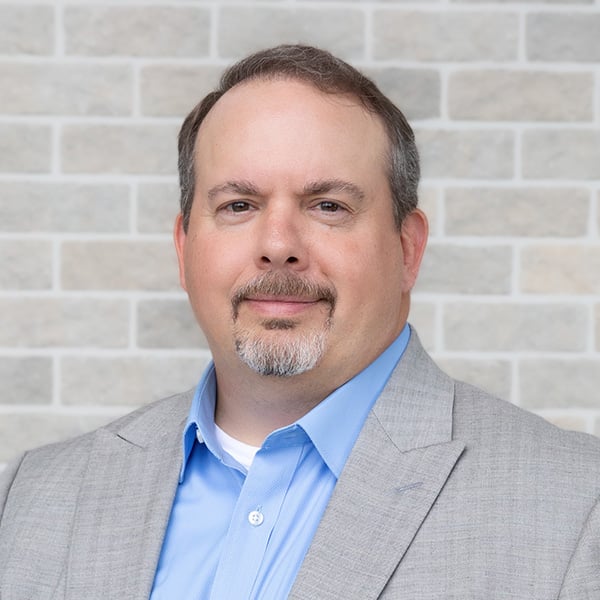
Aaron Grady is the Advisor Consulting Director with USA Financial. He brings more than 18 years of Financial Services industry experience...
Related Posts
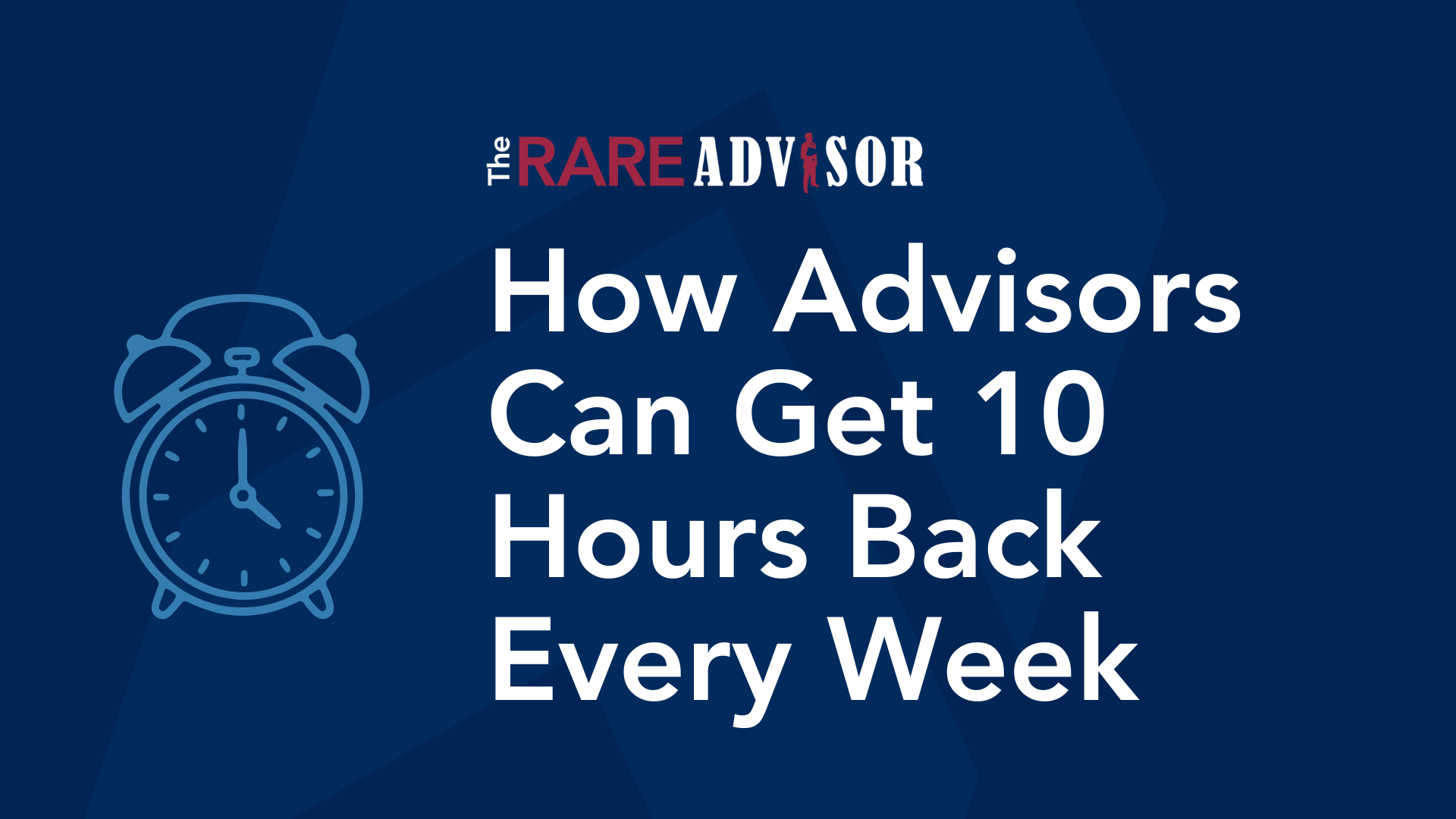
How Advisors Can Get 10 Hours Back Every Week
In this episode of The RARE Advisor, host Aaron Grady and USA Financial Pareto coach and Practice Management Consultant Allan Oehrlein dive into time allocation as a core lever for advisory success. They unpack the biggest time drains—email, unsolicited calls, and open-door interruptions—and lay out a practical framework for calendar rebalancing that starts with personal time, management time, client appointments, dedicated communications windows, “work on the business” time, and high-impact growth activities. With real-world stories showing how advisors shift from reactive days to structured weeks (and even reclaim Fridays), Aaron and Allan share easy-to-implement tips: color coding calendars, scheduling buffers, daily huddles, and call/appointment protocols. If you’re ready to audit your calendar, define your ideal week, and create structure that truly liberates your practice, this conversation is your next step.
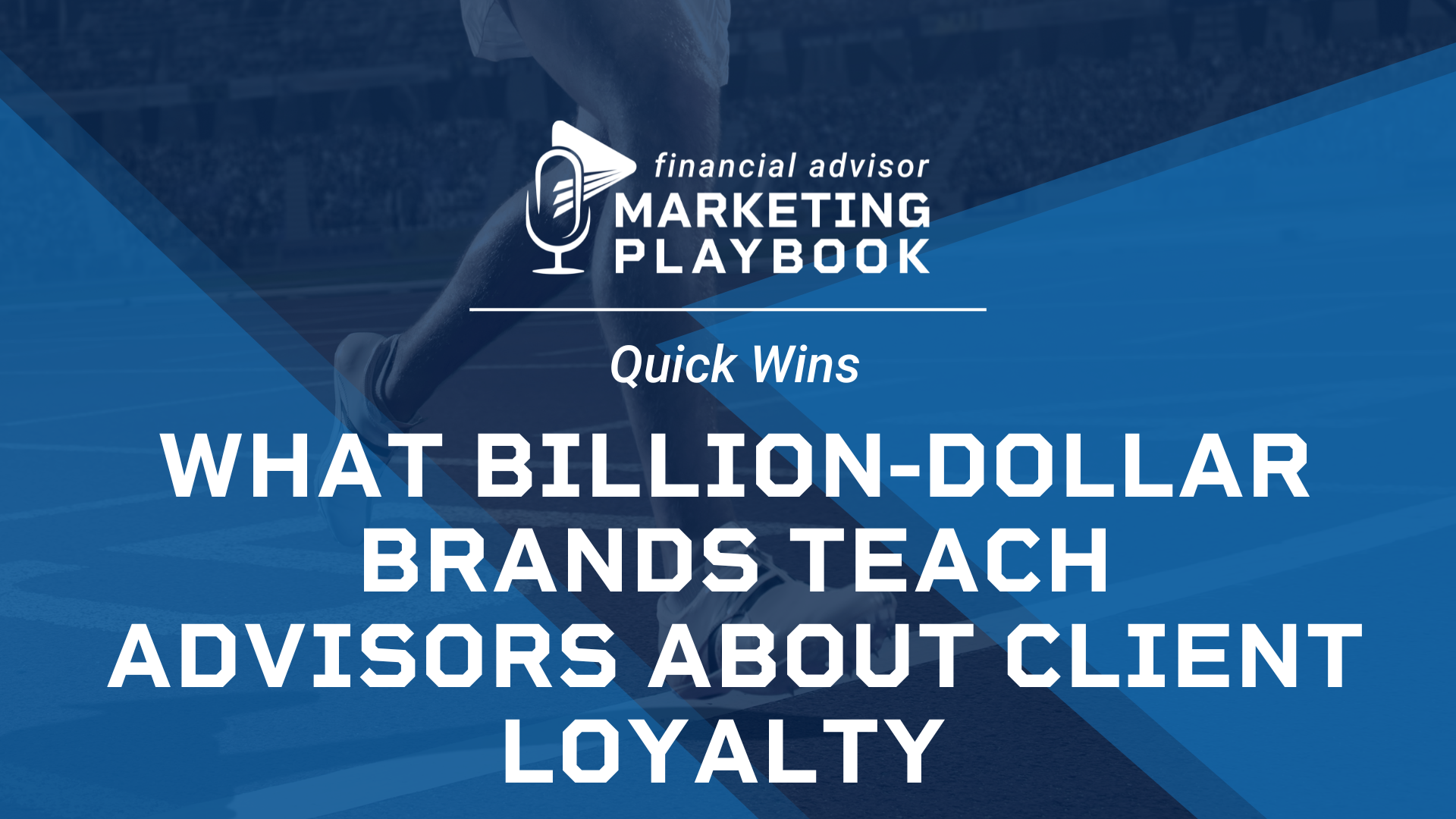
What Billion-Dollar Brands Teach Advisors About Client Loyalty
In this episode of the Financial Advisor Marketing Playbook, Mark Mersman explores what billion-dollar consumer brands like Peloton, Apple, Airbnb, Disney, and Starbucks understand about loyalty—and how financial advisors can apply these lessons to their own practices. Discover why loyalty is emotional, not transactional, and learn practical strategies to create belonging, simplify your process, showcase identity, design unforgettable experiences, and personalize client interactions. Tune in to transform your value proposition and build a community your clients never want to leave.
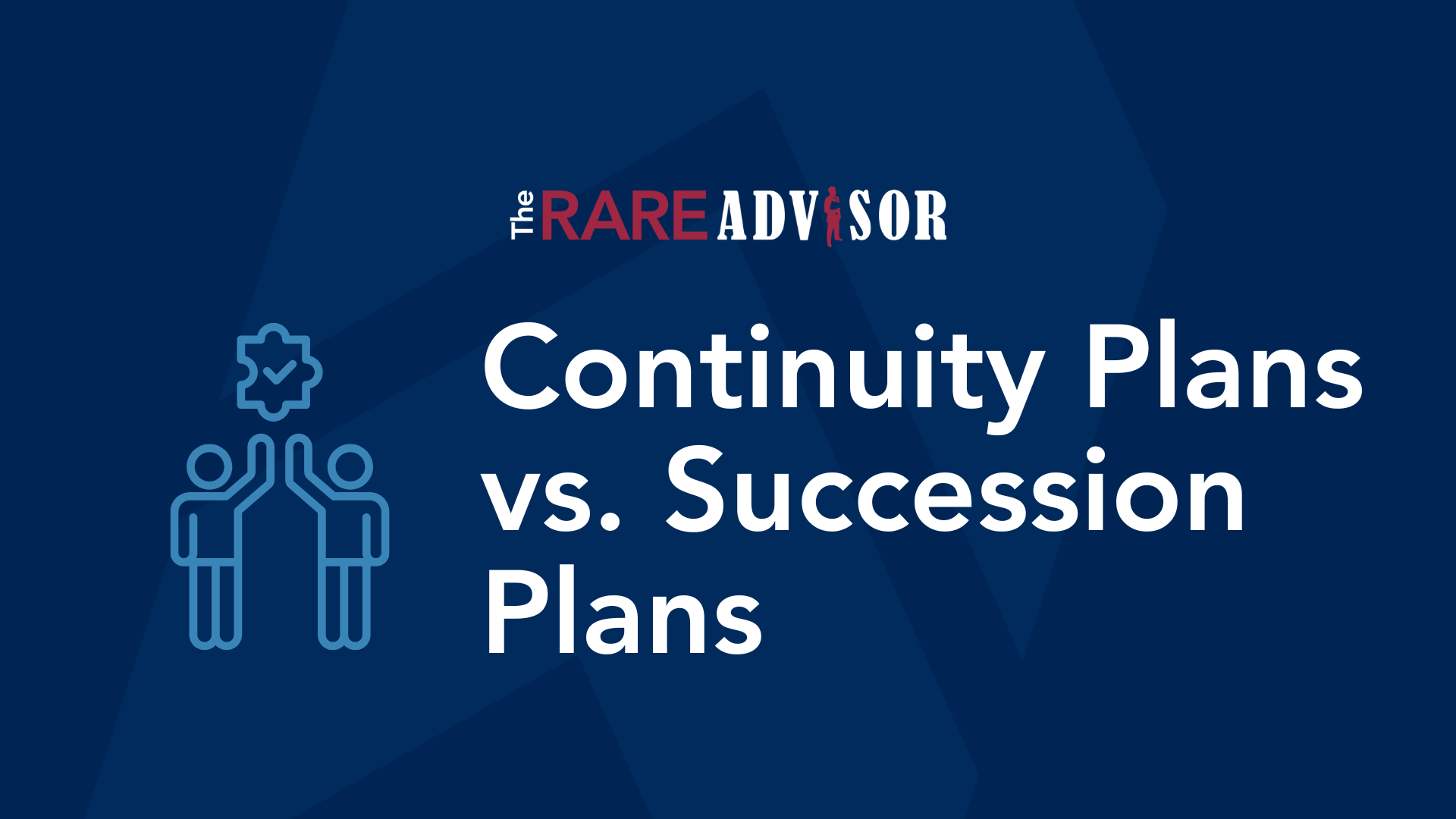
Continuity Plans vs. Succession Plans: Why Every Advisory Practice Needs Both
What’s the difference between a continuity plan and a succession plan—and why does your advisory practice need both? In this episode of The Rare Advisor, Aaron Grady breaks down these two essential strategies, explains how they protect your firm from unexpected events and prepare you for long-term success, and shares practical steps to start building or improving your plans. If you want to safeguard your business, elevate your professionalism, and protect your legacy, this episode is a must-watch.

How Advisors Can Get 10 Hours Back Every Week
In this episode of The RARE Advisor, host Aaron Grady and USA Financial Pareto coach and Practice Management Consultant Allan Oehrlein dive into time allocation as a core lever for advisory success. They unpack the biggest time drains—email, unsolicited calls, and open-door interruptions—and lay out a practical framework for calendar rebalancing that starts with personal time, management time, client appointments, dedicated communications windows, “work on the business” time, and high-impact growth activities. With real-world stories showing how advisors shift from reactive days to structured weeks (and even reclaim Fridays), Aaron and Allan share easy-to-implement tips: color coding calendars, scheduling buffers, daily huddles, and call/appointment protocols. If you’re ready to audit your calendar, define your ideal week, and create structure that truly liberates your practice, this conversation is your next step.

What Billion-Dollar Brands Teach Advisors About Client Loyalty
In this episode of the Financial Advisor Marketing Playbook, Mark Mersman explores what billion-dollar consumer brands like Peloton, Apple, Airbnb, Disney, and Starbucks understand about loyalty—and how financial advisors can apply these lessons to their own practices. Discover why loyalty is emotional, not transactional, and learn practical strategies to create belonging, simplify your process, showcase identity, design unforgettable experiences, and personalize client interactions. Tune in to transform your value proposition and build a community your clients never want to leave.

Continuity Plans vs. Succession Plans: Why Every Advisory Practice Needs Both
What’s the difference between a continuity plan and a succession plan—and why does your advisory practice need both? In this episode of The Rare Advisor, Aaron Grady breaks down these two essential strategies, explains how they protect your firm from unexpected events and prepare you for long-term success, and shares practical steps to start building or improving your plans. If you want to safeguard your business, elevate your professionalism, and protect your legacy, this episode is a must-watch.

